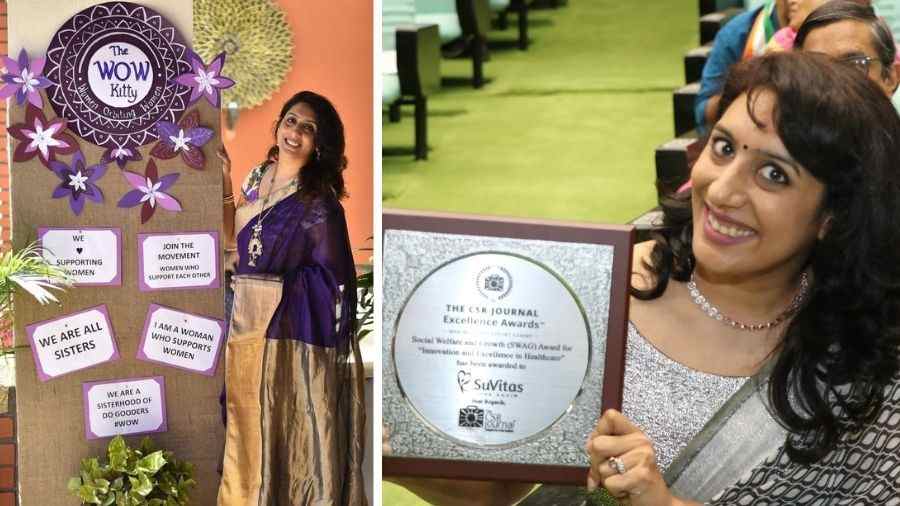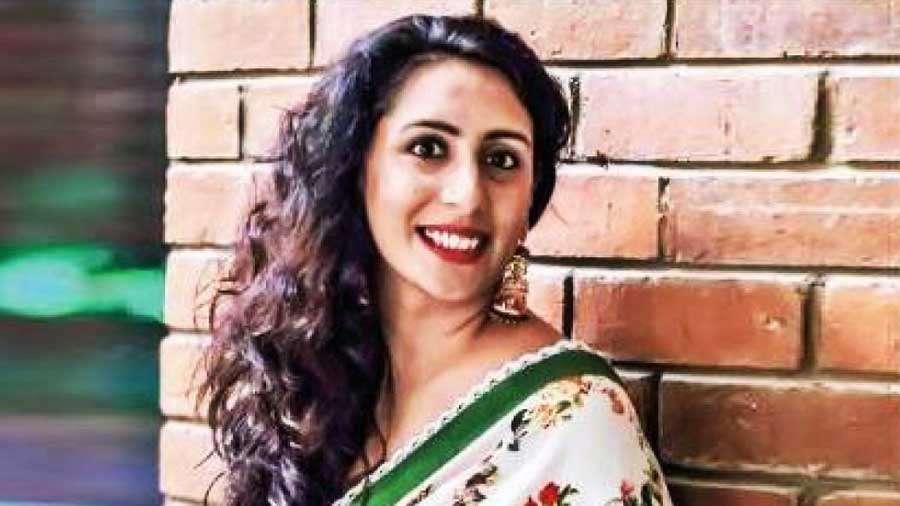ANTRA BHARGAVA may not be a name that many in Kolkata know of. But it is a name that you should know of.
She is the CEO of SuVitas, India's award-winning first Transition Care Hospital Chain, which recently merged with HCAH (HealthCare atHOME, India). Passionate about business and making an impact, she founded The WoW Kitty model, which turned the kitty party model into a micro-financing platform for rural female entrepreneurs. She was one of the first female black belts in Taekwondo and the first and youngest female referee for the sport in the Indian National Games, held in Imphal in 1998. A passionate advocate for equality and safety, she developed the PACE model for all genders and age groups.
My Kolkata got to know her better...
You were born and raised in Kolkata. What are some of your memories here?
I studied in Kolkata, too, in Loreto Dharamtala, La Martiniere and Calcutta International School. Kolkata is in my blood from going to New Market and having coconut macaroons at Nahoum’s to participating in the inter-club activities from Tollygunge Club to RCGC. I was in Kolkata till I completed my Class XII in 1999 and then moved to Trinity College, Dublin.
SuVitas recently merged with HCAH (HealthCare atHOME, India) and is now HCAH SuVitas. How did that happen and what is the way forward?
It was a meeting of minds. Vivek Srivastav, the CEO of HCAH, is a young, dynamic visionary who genuinely wants to make a difference. Putting the ‘care’ back in ‘healthcare’ is very essential. HCAH has a strong foundation in healthcare and its mission is to build India’s largest and most clinically accomplished “hospital outside of hospital”. The merger of SuVitas with HCAH is fabulous news as now we can provide more and better solutions for our community.

Supporting rural female entrepreneurs through The WoW Kitty, which is built on the model of a kitty party; SuVitas won the Innovation & Excellence in Healthcare' award
What was your personal journey that led you to SuVitas?
I think everything in life ties together if you’re willing to be aware of it. My youngest memory of school is volunteering with the Missionaries of Charity. In school we used to be part of the Interact Club. All of this plays a role in setting a foundation of social impact.
Later in life, after climbing the corporate ladder, when I moved back to India, I realised that even though I was in the country I wanted to live in, I felt very anxious that I wasn’t sort of doing what I wanted to do. I thought of volunteering with a lot of organisations and sort of came to the realisation rather late in life that I wanted to make an impact. That that was really where my vocation lay.
I started looking for industries that are naturally impactful. The same week that I came to that realisation, I was connected with someone on LinkedIn who offered me the CEO position at SuVitas, which was a start-up that was looking to do very interesting work in the healthcare space in India.
A few other things also led to that realisation. I had a cancer scare, which luckily didn’t turn out to be cancer but that sort of gave me the impetus that life is short and there’s a lot more to life than just making money and coming home and being with the kids etc.
The other was that I started fostering my second daughter, which then led to her adoption. It was a very profound experience and it gave me clarity.
The third thing was a course that I would recommend for anyone wanting to be a businessman. It allowed me to be certified as a corporate director.
Which course was this?
‘Masterclass for Directors’ by the Institute of Directors. I would recommend it for anybody who wants to be a businessperson. It’s a three-day intensive course but it covers everything from regulatory measures and finance to conflict resolution and decision-making. A lot of people have a great idea but they’re not able to take it to the next level.
You co-founded the WoW Kitty Trust, which took a simple idea like the kitty party and transformed it into a micro-financing model. What triggered the idea?
The Wow Kitty Trust, which is a charitable organisation, uses the kitty party model and disrupts the myth that the kitty party needs to be something frivolous.
When I did the whole gender diversity research for my course thesis, I learnt that there are three reasons or categories of reasons on why the world is not gender blind. The first is societal, the second is institutional bias (things like gender pay gap and maternity leave) and the third is personal (women see each other as competition, they do not collaborate).
The solution is that once you become aware of this, you change it. It was an event at a microfinance charity that Ramji Raghavan, the founder of Agastya International Foundation, said in his speech: “The ideas that change the world are very simple, they come to you as a wow a-ha! moment.”
And it was exactly at that moment that I looked at my friend and said, “Why don’t we take kitty parties and make them into micro-finance institutions?” My friend asked me to shut up and listen to the rest of the speech (laughs) but shortly afterwards, Shoma Bakre, founder of Let's Do Some Good Foundation, talked about how she supported micro-financing and how strongly she believes in the power of B2B lending. So I approached her with my idea at the end of the session. Till today she shares the story of how she thought this was just another person with an idea. So she said, “Yes, yes, yes,” but in her head she was like nothing’s going to happen.
A week later, I organised a meeting with 18 women and WoW Kitty Trust just kicked off.
We pooled a small amount of money, like Rs 1,000 if that’s what one spends on a coffee, and that money would go to the fund and be used to give business loans with zero per cent interest to rural entrepreneur women. The WoW Kitty model has several chapters, disbursed over 900 loans with a 100% repayment rate. We have 70 members right now. It’s a model that can be replicated anywhere. Any kitty party in the world, any group of friends can come together and do this.
You are a firm believer in the fact that one should see every move in life as a learning opportunity and then put the pieces together at the right time. Share with us how your training in martial arts helped you later to create P.A.C.E...
I am one of the first youngest female Indian black belt holders in Taekwondo and one of its first female referees at the National Games of India.
Martial arts is not about fancy footwork; it’s about how you think about risk and how you prepare. So based on my martial arts training and seeing the psychology of gender behaviour and seeing the lack of any thought leadership in this space, I put together a four-step model called PACE, which I have taught to over 20,000 people of all gender and ages. It’s about how to think about building personal safety habits.

Martial arts is not about fancy footwork; it’s about how you think about risk and how you prepare. So based on my martial arts training and seeing the psychology of gender behaviour and seeing the lack of any thought leadership in this space, I put together a four-step model called PACE, which I have taught to over 20,000 people of all gender and ages.
PACE teaches you to be Prepared, A is for Awareness, C is how to respond with Clarity and E stands for Escape. The objective is to escape and not win a situation. The idea is that you divide your life or thoughts into three zones - safe zone (where you’ve done a risk assessment and know that you’re safe), risk zone and crisis zone. How you behave in each zone matters. Because I was taught martial arts like that, it is ingrained in me, to double check, to be rational, objective, unemotional about work. There will always be a crisis and like during Covid, our first response is to button down things and keep everyone safe, not panic, follow protocol and deliver.
